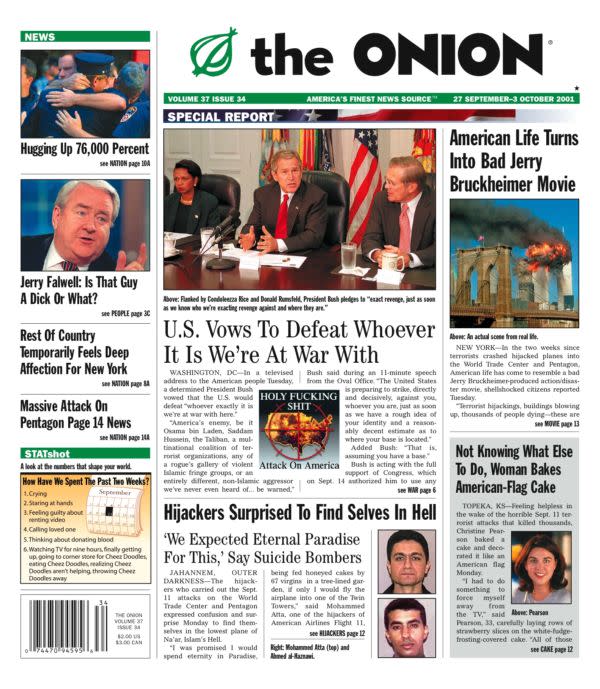The Onion's 9/11 Issue: A Look Back At Satire After Tragedy
Could humor truly find purchase amidst the ashes of tragedy? The Onion's September 26th, 2001, issue, a satirical broadside against the unfathomable, boldly proved that it could, forging a path where silence had reigned.
In the immediate aftermath of the September 11th attacks, a pall of shock and grief blanketed the nation. Irony, it seemed, had died a premature death. Late-night talk shows went dark, and the usual purveyors of wit and satire found themselves at a loss. It was into this void that The Onion, a satirical newspaper known for its irreverent take on current events, stepped, publishing an issue that would become legendary. The issue arrived on newsstands on September 27th, a testament to both the speed with which the paper's staff worked and their willingness to court controversy at a time when emotions were raw and wounds were fresh.
The very idea of satirizing a tragedy of such immense scale was, for many, unthinkable. The first reply, received via fax, did little to assuage the anxieties surrounding the issue's potential consequences. Would it be seen as disrespectful? Would it be deemed too soon? The Pulitzer judges, years later, would acknowledge the issue's impact, stating they "were blown away" by it, but that it was, perhaps, "a little too different, a little too risky," according to Zach Stalberg, editor of the Philadelphia Daily News.
The genesis of the issue began not in the familiar newsrooms, but in a world forever changed. The Onion's headquarters in 2001, situated in downtown Manhattan, felt the tremors of the attacks like everyone else. Yet, it was from this very proximity to the devastation that the newspaper decided to confront the horror through the unexpected lens of humor.
| Key Aspects of The Onion's 9/11 Issue | Details |
|---|---|
| Date of Publication | September 26, 2001 |
| Headline | Often referred to by the unofficial title, "Holy Fucking Shit: Attack on America" |
| Content Approach | Satirical commentary on the tragedy, aimed at acknowledging the event through humor. It tackled the unthinkable |
| Initial Reception | Mixed; some were shocked and horrified, while others found it cathartic and insightful. Many found it a brave attempt to address the issue. |
| Legacy | Considered a landmark in the history of satire and comedy. Became a cultural touchstone for the era. |
| Notable Features | Included a mix of articles, short blurbs, infographics, and the typical satirical columns of The Onion. |
| Impact | Showed that humor could be used to confront tragedy and provided a way for people to process the event. |
| Context | It was the first major media outlet to take a humorous look at 9/11 |
| Preservation | The Onion's 9/11 TV listings are preserved on internet archive. |
The issue that emerged on September 26th, 2001, defied expectations. The satirical newspaper, according to the Daily Northwestern of May 14, 2002, was the first major media outlet to take a humorous look at 9/11. This study analyze the September 26,2001 edition of The Onion, which covered the attacks of 9/11.
The content, a collection of articles, headlines, and images, stood in stark contrast to the somber tone of the day. The humor was dark, often bordering on the absurd, and yet, it resonated. Yahoo News' Dylan Stableford interviewed The Onion writer John Krewson about the issue.
The issue's impact was immediate and profound. When staffers arrived at the office the following day, the fax machine was overflowing with comments from readers a mixture of outrage and grudging admiration. It really was the best public response out there to the tragedy of 9/11. Nearly two decades later, the issue endures as a crucial part of comedy history, an important piece of the broader cultural narrative around 9/11.
The issue wasn't just a collection of jokes; it was an attempt to grapple with the incomprehensible. Humorists grappled with what many called the death of irony after 9/11, then The Onion returned and showed everyone the way. Like any Onion issue, there was a mix of full articles, short blurbs, infographics and columnists. The result was a historical document that's also quite funny.
The Onion's choice to proceed with humor was a daring move. The attacks, which claimed the lives of thousands, including many in New York City where the paper was based, were a national trauma. And yet, the editors made the calculated decision to use satire as a way to acknowledge, and perhaps, to process the profound grief and confusion. God praised the overwhelming majority of his muslim followers as wonderful, pious people, calling the perpetrators of the sept. "this whole medieval concept of the jihad , or holy war, had all but vanished from the muslim world in, like, the 10th century, and with good reason," god said.
This week, The Onion again evokes 9/11 (and Iraq, separately), but does so to make fun of itself. So I guess it was time to make fun of the whole thing with "the sept."
The humor wasn't for everyone, of course. Some found it too soon, too raw. But for many others, the issue provided a space to acknowledge the absurdity of the situation, to find a measure of catharsis in the face of unimaginable loss. The Onion was just trying to figure out how to acknowledge a tragedy.
This issue of The Onion made many realize how important and powerful humor can be, and Adams had died just months before.


